- Home
- Sharyn McCrumb
The Ballad of Frankie Silver Page 15
The Ballad of Frankie Silver Read online
Page 15
At that moment Constable Pearson threw open the doors to the court, and a seething crowd pushed past him, elbowing one another for the best positions and making loud and uncouth comments about the proceedings. I saw a grim-faced Isaiah Stewart shepherding his wife and sons to a place on the side of the courtroom, a place where the defendant could see them, although they were not near enough to converse. I saw her cast a stricken look at her mother, but I could not tell what emotion was conveyed in the returned gaze.
At last Judge Donnell took his place at the bench and called the court to order.
“Frances Stewart Silver.”
The defendant stood up, and I fancied that she swayed for a moment before steadying herself on the edge of the table. Nicholas Woodfin placed a gentle hand on her arm and held her attention with a calm, steady stare, much as one might use to quiet a frightened mare. She took a deep breath and nodded slightly, and together they approached the bar.
Judge Donnell consulted the indictment that Mr. Alexander had carefully copied out for him. It was substantially the same document that the prosecutor had prepared for the grand jury hearing ten days earlier, but in this version the names of Barbara and Blackston Stewart were omitted, because the grand jury had not seen fit to bind them over for trial. Judge Donnell read Mr. Alexander’s carefully wrought document, his lips moving soundlessly through the phrases, which consisted of but a single tortuous sentence, so long and intricate as to tax the orative powers of even the ablest judge. After a few more moments’ contemplation, he began to read the document aloud in a steady drone, marked only by the ripple of his Scots brogue on a word here and there.
“State of North Carolina. Burke County. Superior Court of Law. Spring Term 1832. The jurors for the State upon their oath do present that Frances Stewart of said county, not having the fear of God before her eyes, but being moved and seduced by the instigation of the devil, on the twenty-second day of December in the year of our Lord one thousand eight hundred and thirty-one, with force and arms in the County of Burke aforesaid, in and upon one Charles Silver in the peace of God and of the State, then and there being feloniously, wilfully, and of malice aforethought did make an assault; and that the said Frances Silver with a certain axe of the value of six pence, which the said Frances Silver in both hands of her, the said Frances Silver then and there had and held to, against, and upon the said Charles Silver, then and there feloniously, wilfully, and of her malice aforethought did cast and throw; and that the said Frances Silver with the axe aforesaid so cast and thrown, as aforesaid, the said Charles Silver in and upon the head of him, the said Charles Silver, then and there feloniously, wilfully, and of her malice aforethought with the axe aforesaid, so as aforesaid by the said Frances Silver cast and thrown, in and upon the head of him, the said Charles Silver one mortal wound of the length of three inches and of the depth of one inch; of which said mortal wound he, the said Charles Silver, then and there instantly died; and so the grand jurors aforesaid, upon their oath aforesaid, do say that the said Frances Silver, him, the said Charles Silver, in manner and form aforesaid feloniously, wilfully, and of her malice aforethought did kill and murder against the peace and dignity of the State.”
He paused for a moment while the thunder of his final words echoed in the murmurs of the spectators. What a talent for rigmarole Mr. Alexander has got, I was thinking. Thesaid s andaforesaid s rumbled through the air like drumbeats. The prosecutor’s carefully wrought indictment was as majestic in sound and cadence as a mass in Latin, and surely as incomprehensible to the majority of its hearers.
Mrs. Silver stood there looking down at the floor, letting the words wash over her head like a mighty river, and understanding not a syllable of their sense, I am certain, for when Judge Donnell said, “How do you plead?” she merely stared up at him, bewildered.
His Honor spoke louder. “How say you, Frances Silver, are you guilty or not guilty?”
There must have been a nudge or a sign from Nicholas Woodfin indicating that this was her cue (they had rehearsed the process beforehand, surely), for suddenly Mrs. Silver stood up straighter, and in a clear, soft voice she said, “Not guilty.”
This response came as no surprise to anyone. Since the penalty for murder is inevitably death, there is nothing to be gained by admitting one’s guilt. No doubt Woodfin and Wilson had explained to their client that her only chance to escape the gallows was to fight the accusation in open court.
Not guilty.
Judge Donnell nodded to Woodfin and Alexander, and then he uttered the phrase that would begin the trial: “Then let the jury come.”
Why must I say I’m not guilty, I asked them. Why can’t I just tell them all how it was right then and there, and then they can decide for themselves what should be done with me. Anybody ought to be able to see how it was-even town folk. The old lawyer, Mr. Wilson-he is black and skinny like a crow-he smiled down his beak at me and said, “Proper procedure must be followed in a court of law.” His Adam’s apple bobs in his throat when he speaks to me, and I wonder if he is dry-mouthed and has trouble swallowing, on account of being in the presence of a wicked murderess. I keep my eyes downcast, and I speak in a soft voice, though, for I do not want them to think me mad-or, worse yet, an ignorant savage from nowhere, for they would hang me without a second thought if they convicted me of that-of being a nobody.
My father has money and can pay for my defense. He comes from good people down in Anson County, near the town of Charlotte, which is where the enemy lawyer hails from. My grandfather William Stewart was a proper man of business in the county, and once he lawed some fellow in court, just like gentlemen are always doing to settle some dispute.
We settle disputes different up the mountain.
I used to speak more ladylike when I was a young ’un, before we came to this place, but I have got out of the way of it now. There wasn’t much call for fine words up the mountain. Hard work is what talks the loudest up there.
The young fellow, though-Mr. Woodfin, his name is-he nodded his head, and said, “I wish you could just tell your tale straight out. It must have been possible to do so in a court of law once upon a time, Frankie, but now we have a great book full of rules concerning the conduct of a trial. It is a game we lawyers play, and you must bear with us.”
I like him. He has a well-scrubbed look about him, and calf’s eyes, and his clothes are right out of a picture book. He is like the prince in the fairy tale. He looks straight into my eyes and says that he will not stand to see me hanged.
So I am safe.
Chapter Four
SPENCER ARROWOOD had watched hours of television, eaten meals he barely tasted, and slept more than he needed to before Martha reappeared with another handful of mail and a stack of library books. She brushed aside his questions about work at the office, announced that she could get her own cup of coffee, and insisted that he look at what she’d brought.
“Nobody has ever written a book on Frankie Silver that I can find,” she told him. “But she has rated quite a few chapters in local histories. I brought you a couple of old books,Dead and Gone andCabin in the Laurels for starters. I looked over them last night, by the way. They’re pretty interesting.”
Spencer smiled. “Thanks, but I haven’t been to the bank lately. Do you take checks?”
“Consider it a get-well gift, Spencer, I don’t do casseroles. Anyhow, they’re both used, so the Book Place let me have them cheap. They even marked the pages for you. How are you feeling?”
Spencer sighed. “I’ve been better. Thanks for the books.”
“I brought you something else that you might want to see.” She handed him a copy of theJohnson City Chronicle open to the headlinePARENTS OF SLAIN GIRL DEMAND DEATH OF KILLER. Colonel Charles Wythe Stanton, older and grayer but still in charge, stared out at him from the page of newsprint. He was wearing a dark suit and tie instead of an army uniform, but his piercing expression had not changed. Spencer skimmed the article, already knowing what it would say
.
“Colonel Charles Stanton (U.S. Army-ret.), whose daughter Emily was murdered on the Appalachian Trail in 1977, met today with a Tennessee victims’ organization to discuss the scheduled execution of the man who killed his daughter. ‘Fate Harkryder should be executed at once,’ Colonel Stanton told the group. ‘His legal ploys have given him twenty years of life to which he was not entitled. I wish he had shown as much mercy to my daughter. He didn’t let her live to be twenty.’ Colonel Stanton stressed the victims’ families’ need for closure, so that they can go on with their lives.” The article went on for another half dozen paragraphs, but Spencer had heard it all before, and he didn’t dispute any of it. That wasn’t what worried him.
“Where’s the front page of the paper, Martha?” asked Spencer, noting that the part he was reading was section B.
“LeDonne spilled Pepsi on it this morning,” said Martha with a shrug. “It wasn’t dry yet.”
He heard an odd note in her voice, and filed it away for future consideration.
Martha turned her deck chair to face the view of sunlit mountains and sat down across the table from him. “I don’t know how you can bear to go inside,” she said. “I’d just stare out at these hills for hours at a time.”
He smiled. “It gets cold up here after sunset.”
“It’s always a different scene, though, isn’t it? The mountains change color from one day to the next. I can count six shades of green without even turning my head. So peaceful.”
“Most of the time.” There was a small photo of Emily Stanton accompanying the newspaper article.
Martha took a sip of coffee. “Have you done any more thinking about Frankie Silver?”
“Off and on,” he said, shrugging. “It doesn’t fit into my experience anywhere yet. She was an eighteen-year-old girl. By all accounts she was pretty, hardworking, and virtuous. Yet she killed her young husband with an ax. Why would she do that?”
“Maybe she was crazy?”
“She seemed sane enough during the trial, apparently. They convicted her anyhow.”
“Cabin fever? It was winter when it happened. I remember Mrs. Honeycutt talking about snow on the ground and the river being frozen. Maybe she just got tired of being shut up in that little one-room cage.” Martha shivered. “I know I would.”
“Yes,” said Spencer, “but you hadn’t lived in a place like that all your life. Surely Frankie Silver was used to it.”
“I guess you’re right,” said Martha. “Maybe you’ll never understand it. Times were different then. I don’t see what you can do with a case that’s a hundred and fifty years old, with not even a crime scene left to look at, but if it keeps you off your feet for a while longer, then I’m all for it. Better than thinking about that other case.”
“Fate Harkryder.”
“There’s nothing you can do about that one, either. Are you still thinking about going to the-” She didn’t want to sayexecution.
He nodded. “I called and told them I would. If it happens.”
“Which it won’t,” said Martha. She stood up and brushed imaginary dust from her trousers. “Well, I wish I had time to sit up here in this pretty place looking at mountains and playing detective, but I guess I have to go prowl for expired car-inspection stickers.”
Spencer smiled. “Prowling for expired county stickers isn’t unimportant, Martha. The county needs the revenue. How is Joe doing?”
“Oh, he’ll be up one of these days. You know how he is.”
“Tell him I’m not sick,” said Spencer. LeDonne would rather work twenty-hour days than visit sick people.
When Martha had gone, Spencer turned again to the article in the newspaper. He had not wanted her to see how concerned he was about the case. Martha worried too much.
The photograph seemed to be staring directly at him from out of the newspaper. Charles Wythe Stanton, still alive, still fighting the enemy. Spencer remembered him well. He had been the one to inform the colonel that his only daughter had been murdered.
On the night of Emily Stanton’s murder (and Mike Wilson’s as well, but people tended to forget about him), Spencer and the TBI officer spent the rest of that night making a grid of the crime scene, stretching twine from one wooden stake to another so that the entire area was marked off into small squares like a checkerboard. They would search each parcel of the site for cigarette butts, gum wrappers, clothing fibers-anything that might have a bearing on the case.
At last the sky lightened to a pall of gray, and the objects beyond the reach of their flashlights began to become more distinct in the haze. The TBI man glanced at his watch. “We’ll check the site again in about twenty minutes,” he said. “For now, let’s check all the approaches to this clearing to see if the assailant discarded anything.”
Spencer glanced at the two bodies, which were becoming clearer with every passing minute, and he thought of a photograph taking form in the developing fluid. “When are we going to move them?” he asked.
“Within the hour. They go to University Hospital in Knoxville for a complete workup. I’ll give you that information to pass along to the families.” He looked down at the two sprawled bodies in the clearing and sighed. “We’ll move them before the flies come out, I promise.”
“Good,” said Spencer. One side of the girl’s face looked as if she were only sleeping, and he didn’t want to see her covered in insects.
“When it gets light enough, we’ll tilt the bodies, see what’s under them. I found a tooth under the victim once. Belonged to the killer.”
Spencer nodded. He couldn’t think of anything to say. He set off on a path that led back into the forest, training his flashlight on the ground in front of it and letting the light play left and right to illuminate the weeds at the side of the trail. He saw no broken twigs or evidence of a struggle, or even of footprints, and his hunch that the killer had not come this way was confirmed a few moments later by a triumphant cry from the other officer. Spencer had forgotten his name almost the instant he heard it, and he would forever think of the investigator as “the TBI man,” the embodiment of a faceless state bureaucracy.
He hurried back to the clearing. The officer had laid out the wallets on the log where Willis Blaine, the ranger, had sat for much of the night. The dark brown leather one was worn and scratched, obviously the property of the man. Beside it lay a small red clutch purse containing a compartment for coins, as well as a notepad and a compartment for paper money. “I found them about twenty yards down the hill,” said the TBI man with a satisfied smile. “Killer must have taken the money and thrown down the billfolds as he ran. Who knows? We might even get prints.” He pried open the two sections of leather with a gloved finger. “Can you read that? I’m no good at fine print in this light.”
It seemed perfectly clear to Spencer, who was still a long way from thirty, from bifocals, from having to read the newspaper at arm’s length, as he did these days. “Michael Wilson,” he said. “Virginia driver’s license. He’s twenty-one. There’s a student ID in there, too. University of North Carolina.”
“Yeah, I figured they were college kids. A lot of these hikers are. So they’re not from around here. That figures.”
“How so?” asked Spencer.
“Stranger killing. They were ambushed out in public land. This wasn’t some guy offing his girlfriend, or a fight between two old enemies. Somebody was hunting, and hunters don’t care about the identity of the victim. Who was the girl?”
Spencer fingered the soft leather clutch purse. He imagined it still warm from being tucked away in the hip pocket of the girl’s jeans, pressing against her buttocks. “Emily Stanton. Driver’s license says Wilmington, North Carolina.” A solemn young woman with long auburn hair and dainty small-boned features looked out at him from the license photo. He could see tiny gold hoops in her ears, and a pearl necklace against the dark blue background of her dress.Sorority type, he thought.I wonder what she made of the trail. He said, “There’s also a student ID
for UNC.”
“Yep. I figured. College sweethearts, taking a little vacation together after classes ended. Rich kids, too. At least, she was.”
Spencer glanced at the body. The small figure had been wearing jeans and a plain black sweatshirt. Now they lay crumpled a few feet away from her body. “How can you tell?”
The officer smiled. “It helps to have kids, Deputy. I recognize the brand names on her clothing. That outfit may look like old jeans and sneakers to you, but she paid a couple hundred bucks for them. I probably would have known even without that, but it isn’t something I could explain.” He shrugged. “Her manicured nails. Her hairstyle. After you observe people for enough years, you justknow.”
“A robbery that got out of hand then?”
“No. There won’t be any money in the wallets, but taking the cash was an afterthought.”
Spencer poked a finger inside the billfold. Empty. The TBI guy was right. “Not the motive, though?”
“Incidentally, sure. I mean, the cash is just lying there. It’s not going to do the victims any good. Why not take it? But that’s not the real reason the killer did this. He did this for fun, because he’s so mad at something that this is his way of striking back.”
Spencer said,“I am reckless what I do to spite the world.” He shrugged. “I always liked that line.”
The older man smiled.“Macbeth,” he said. “It’s nice to hear Shakespeare every now and then from an officer, instead of Kris Kristofferson, which is what passes for philosophy these days.”
“I like him, too,” said Spencer. “So you think this guy we’re looking for is more than a thief whose robbery got out of hand?”
“He’s a killer first and foremost. Have there been any other unsolved murders around here?”
“No.”
“Any disappearances? Maybe you just didn’t find the bodies.”
“No missing persons.”
“Maybe he’s not from around here then. You’d better hope he doesn’t decide to stay a while. This kind of thing is habit-forming. There should be more victims sometime… somewhere.”

 Elizabeth MacPherson 07 - MacPherson’s Lament
Elizabeth MacPherson 07 - MacPherson’s Lament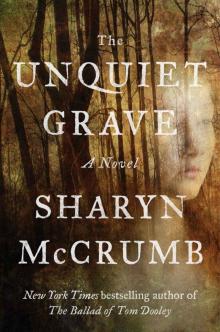 The Unquiet Grave: A Novel
The Unquiet Grave: A Novel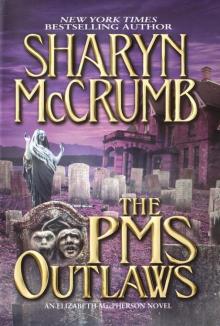 The PMS Outlaws: An Elizabeth MacPherson Novel
The PMS Outlaws: An Elizabeth MacPherson Novel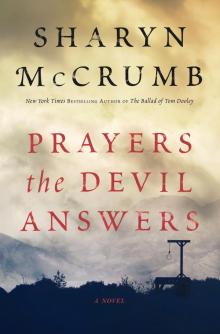 Prayers the Devil Answers
Prayers the Devil Answers Paying the Piper
Paying the Piper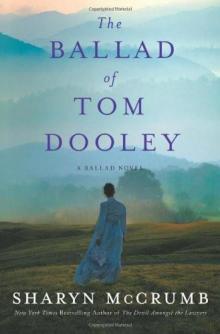 The Ballad of Tom Dooley: A Ballad Novel
The Ballad of Tom Dooley: A Ballad Novel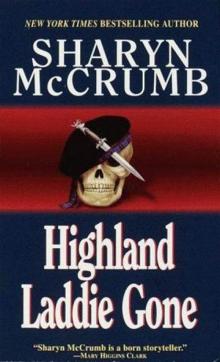 Highland Laddie Gone
Highland Laddie Gone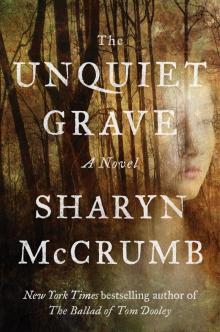 The Unquiet Grave
The Unquiet Grave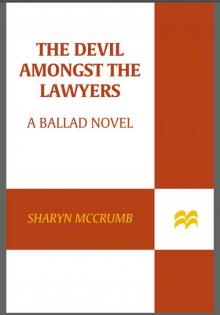 The Devil Amongst the Lawyers
The Devil Amongst the Lawyers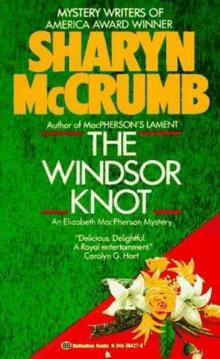 The Windsor Knot
The Windsor Knot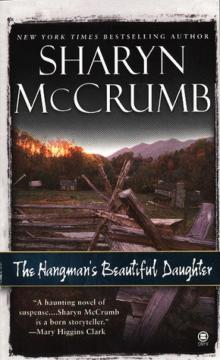 The Hangman's Beautiful Daughter
The Hangman's Beautiful Daughter MacPherson's Lament
MacPherson's Lament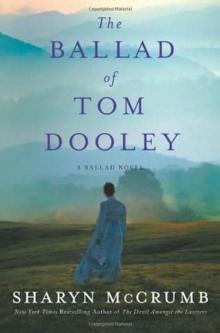 The Ballad of Tom Dooley
The Ballad of Tom Dooley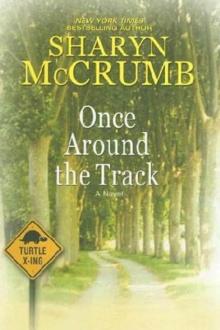 Once Around the Track
Once Around the Track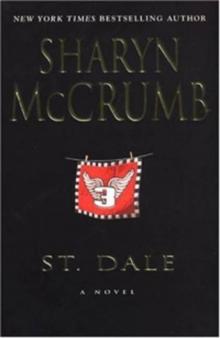 St. Dale
St. Dale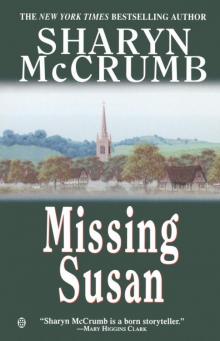 Elizabeth MacPherson 06 - Missing Susan
Elizabeth MacPherson 06 - Missing Susan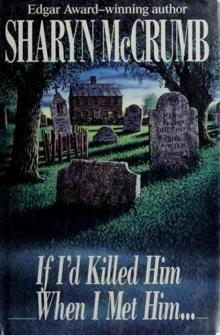 If I'd Killed Him When I Met Him…
If I'd Killed Him When I Met Him…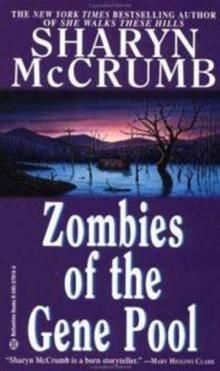 Zombies of the Gene Pool
Zombies of the Gene Pool Bimbos of the Death Sun
Bimbos of the Death Sun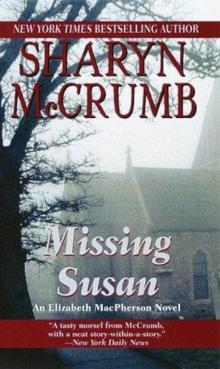 Missing Susan
Missing Susan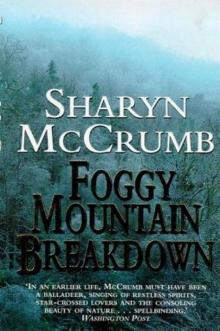 Foggy Mountain Breakdown and Other Stories
Foggy Mountain Breakdown and Other Stories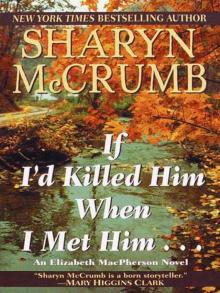 If I'd Killed Him When I Met Him
If I'd Killed Him When I Met Him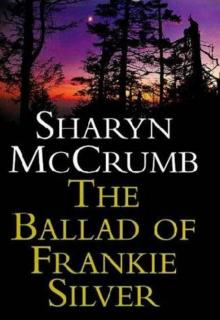 The Ballad of Frankie Silver
The Ballad of Frankie Silver Lovely In Her Bones
Lovely In Her Bones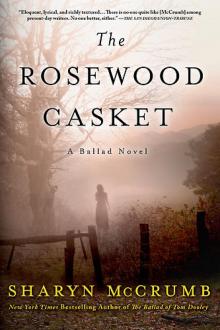 The Rosewood Casket
The Rosewood Casket King's Mountain
King's Mountain